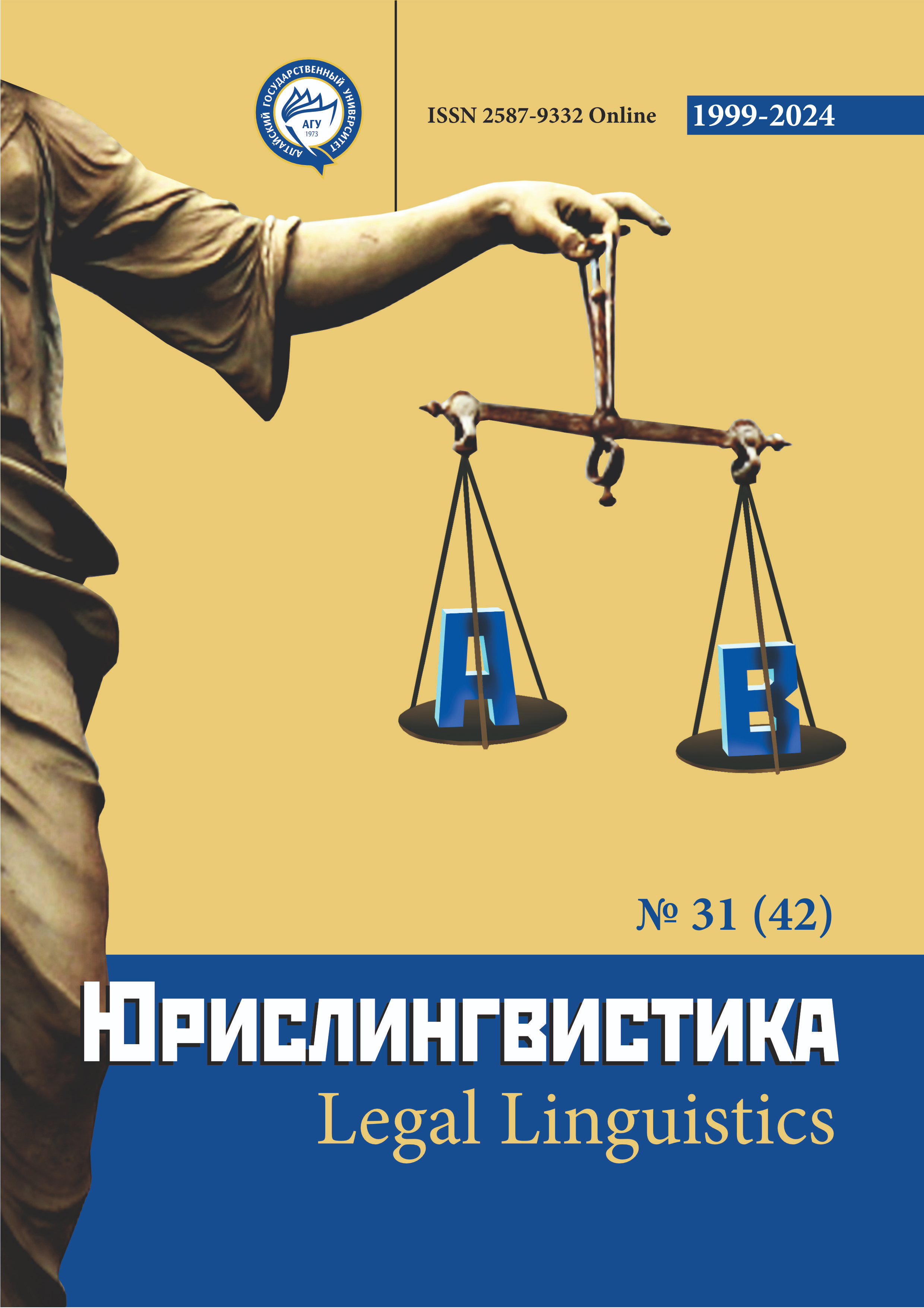Legal and Linguistic Analysis of the Concept of Diversion of Public Funds (Article 285.1 of the Criminal Code of the Russian Federation)
УДК 343.01, ББК 67.408
Abstract
The article considers one of the most complex criminal law norms on officeholder crimes – diversion of public funds (Article 285.1 of the Criminal Code of the Russian Federation). The author uses the interdisciplinary methodology of norm analysis and explores the main categories fixed in the disposition – expenditure, public funds, recipient of public funds. There are four stages in the study – the study of the lexical meaning of the category, the definition of its meaning in budget legislation (regulatory), in administrative (the first level of protective legislation), and at the final stage determines the meaning of the term in regards to criminal law sense. The disposition of Article 285.1 of the Criminal Code of the Russian Federation has a blank character and in order to establish its content, it is necessary to refer to the norms of primary legislation. The research conducted by the author allows us to conclude about the intersectoral belonging of the norms of diversion of public funds, including in terms of the categorical apparatus. Thus, by studying the three system–forming categories of the corpus delicti provided for in Article 285.1 of the Criminal Code of the Russian Federation - expenditure of public funds, and the recipient of public funds revealed the inconsistency of the criminal law norm under consideration with the principles of legality, justice, equality. To solve this problem, the author proposes to amend art . 285.1 of the Criminal Code of the Russian Federation by including in it indications of the possibility of committing a crime by an officeholder recipient of funds from the budget, as well as to clarify the concept of "expenditure" and "public funds" in the Ruling of the Plenary Session of the Supreme Court of the Russian Federation.
Downloads
Metrics
References
Деменкова Н. Г. Административная ответственность за нецелевое использование бюджетных средств: Дис. ... канд. юрид. наук. Благовещенск, 2007.
Журков В. В. Нецелевое расходование бюджетных средств: исторический аспект / Юридическая наука. - 2012. - № 2. - С. 8-10.
Карандаев И. Ю. Понятие «бюджетные средства» в контексте финансирования деятельности бюджетных учреждений в Российской Федерации / Актуальные проблемы российского права. - 2014. - № 5. - С. 775-780.
Комягин Д. Л. Проблемы определения бюджетных средств / Право и экономика. - 2000. - №7. - С. 28-30.
Коренная А. А. Теоретико-прикладной анализ категории «воспрепятствование» в статьях Особенной части Уголовного кодекса РФ / Юрислингвистика. – 2023. - № 27(38). - С. 56-62.
Кустова М. В. Обращение взыскания по судебному акту на средства казны: бюджетные процедуры против материального права / Закон. - 2021. - № 4. - С. 147-153.
Мариненко В. Ю. Некоторые особенности объективной стороны нецелевого расходования бюджетных средств / Северокавказский юридический вестник. - 2010. - № 3. - С. 86.
Отчет о числе осужденных по всем составам преступлений в Уголовном кодексе Российской Федерации. Судебный Департамент при Верховном суде РФ. Данные судебной статистики. URL: http://cdep.ru/?id=79
Поветкина Н. А. Трансформация бюджетного законодательства: причины, формы, перспективы / Финансовое право. 2021. № 12. С. 20-23.
Словарь русского языка: В 4-х т. / РАН, Ин-т лингвистич. исследований; Под ред. А. П. Евгеньевой. 4-е изд., стер. М., 1999; URL: http://feb-web.ru/feb/mas/mas-abc/09/ma168403.htm?cmd=0&istext=1
Толковый словарь русского языка» под редакцией Д. Н. Ушакова (1935-1940). URL: http://feb-web.ru/feb/ushakov/ush-abc/17/us3c8603.htm?cmd=0&istext=1
Фазылов Р. Р. Уголовная ответственность за нецелевое расходование бюджетных средств и средств государственных внебюджетных фондов: Дис. ... канд. юрид. наук. Казань, 2005.
Экономико-математический словарь: Словарь современной экономической науки. М., 2003. URL: https://economic_mathematics.academic.ru/3783/Расходование
Copyright (c) 2024 Виталий Полтарыхин

This work is licensed under a Creative Commons Attribution 4.0 International License.
The authors, which are published in this journal, agree to the following conditions:
1. Authors retain the copyright to the work and transfer to the journal the right of the first publication along with the work, at the same time licensing it under the terms of the Creative Commons Attribution License, which allows others to distribute this work with the obligatory indication of the authorship of this work and a link to the original publication in this journal .
2. The authors retain the right to enter into separate, additional contractual agreements for the non-exclusive distribution of the version of the work published by this journal (for example, to place it in the university depository or to publish it in a book), with reference to the original publication in this journal.
3. Authors are allowed to post their work on the Internet (for example, in a university repository or on their personal website) before and during the review process of this journal, as this may lead to a productive discussion, as well as more links to this published work (See The Effect of Open Access).











